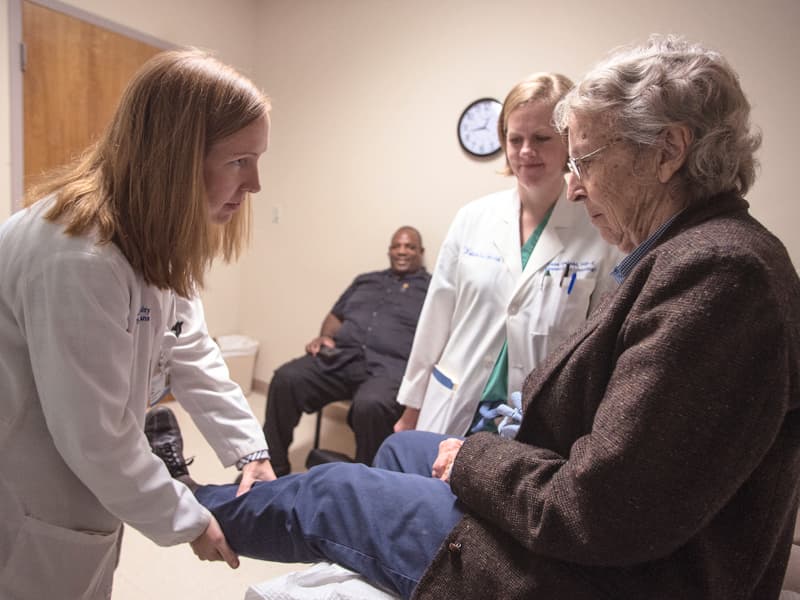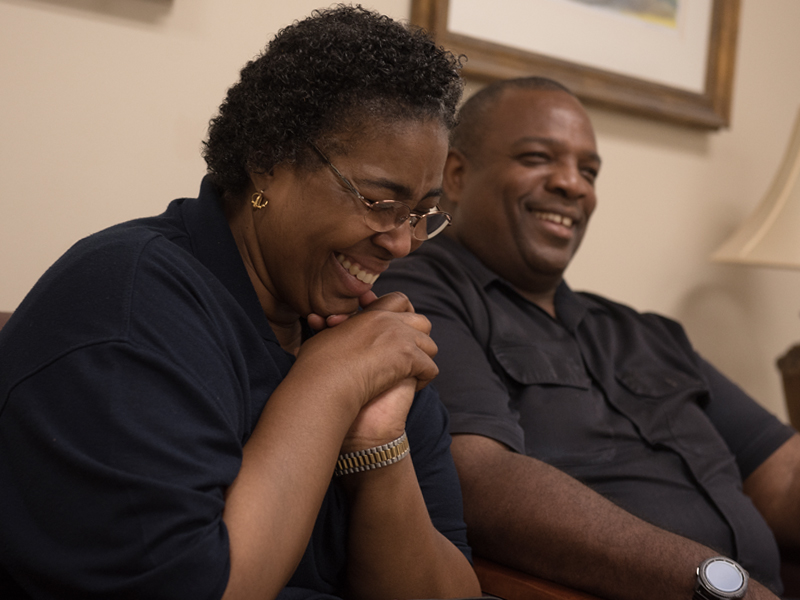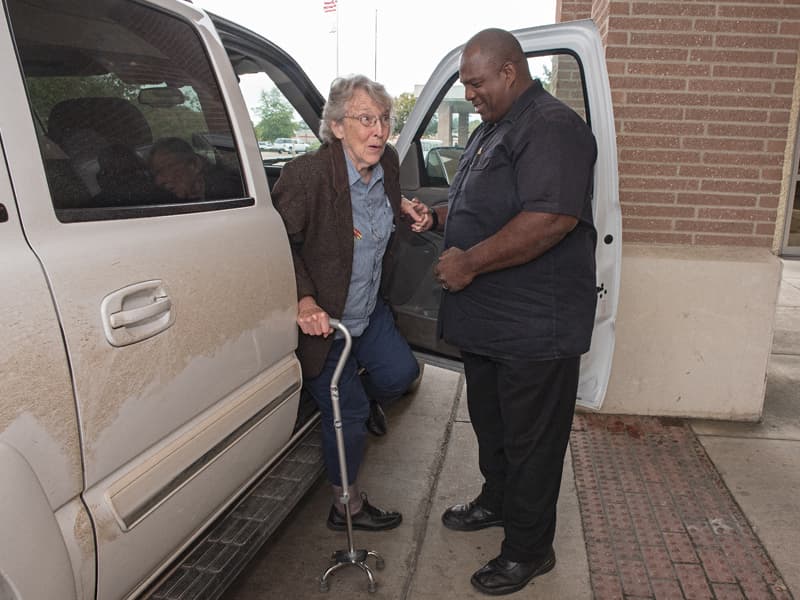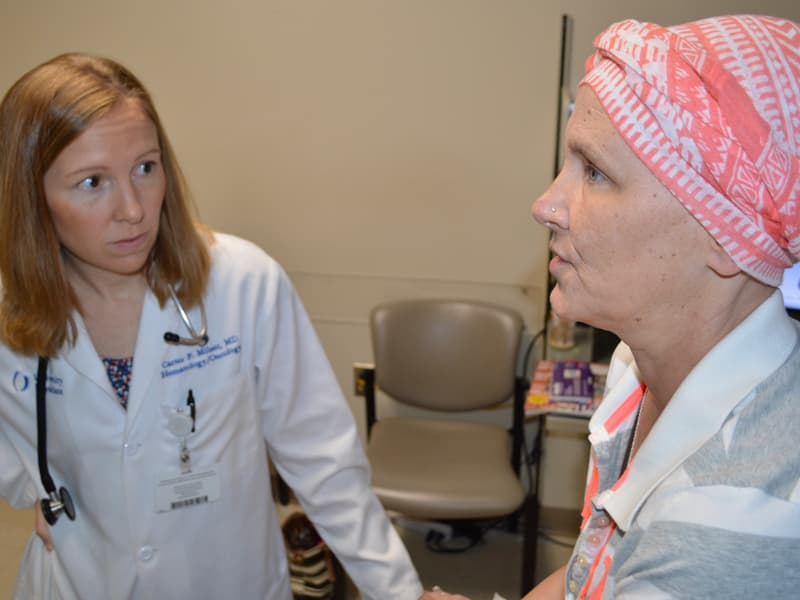Caregivers provide crucial, intimate element of medical care

Helping others is as innate as breathing for David Franklin of Brookhaven.
Franklin, pastor of Christ Church International in Brookhaven, knows how important caregivers are and after years of bringing his wife and others he considers family to the University of Mississippi Medical Center, has too much practice in the role.
He cared for his wife, Edwina, through a brain aneurysm and two bouts with Stage 4 B-cell lymphoma.
Now the couple are helping care for two others in Brookhaven:
- Gloria Brown also is fighting her second battle with follicular lymphoma, and
- Stacey Parker is battling Mantle Cell Lymphoma and preparing for a stem cell transplant.
Care provided by family and friends is crucial to a cancer patient’s recovery, UMMC Cancer Institute doctors say. And, the Franklins are exemplary caregivers, say medical staff who have worked with them.
Recently, the couple talked about their journey and the role caregivers played in it.
Most important, David said, “Care has to be offered out of love and not out of responsibility. To be a real caregiver, you have to be loving and love has to be driven by something real and divine, Christ’s love. It pushes us to the max.”
From a professional standpoint, said Dr. Carter Milner, assistant professor of medicine and a hematologist/oncologist at the Cancer Institute, “Doctors see a difference in patients who have support and those who don’t.”
“Caregivers are important from a mental, spiritual and physical standpoint,” she said.
“Because of the Franklins’ journey they understand the importance of treating people like family and supporting them through a journey that is uncertain, thus providing consistency in their lives,” Milner said.
“The Franklins have taught me a lot about compassion and what it means to love each other,” she said.

David and Edwina Franklin
David’s role as a medical caregiver intensified in 2009 when Edwina suffered a brain aneurysm. Alerted by their daughter, one of eight adopted children, he flew home from a conference in Houston to meet Edwina who was flown from Brookhaven to UMMC.
“The doctor told me we’ve done all we can. He had papers for me to sign. I looked at her and walked over to her and told her to ‘wake up in Jesus name’ and she opened her eyes and said, ‘Hi Honey’ and it freaked the doctor out.”
Slowly, she recovered, learning to walk, talk and recover memories the aneurysm had disrupted.
In 2013, Edwina was diagnosed with Stage 4 lymphoma, was treated and went into remission. David was her chauffer, her rock, she said. Her sister, children, friends and church members helped at home.
“He was my best nurse. There is no one better. I am very grateful,” she said, touching his arm.
“We were in the hospital about every three weeks,” David said.
“It was not my duty but my joy to take care of her. I knew she would be more comfortable with me.”
But the lymphoma returned two years later and the couple faced a stem cell transplant. Transplants require about a 30-day hospital stay while doctors give medications to destroy the bone marrow then replenish it with new cancer-free stem cells.
Milner says a psychosocial evaluation is required before a transplant and caregiver support is a critical part of it.
David calls the transplant hard. He told his church he would be with Edwina. “Chemo is so hard. Have your heart ready for the long haul. We depended on others to help. Some cooked, some cleaned.”
Illness brings emotional and physical stress to a caregiver, he said. “As a caregiver, I had to hold onto my Christian faith. And we had people to encourage us and pray for us.”
Humor helps too. “Many nights when I had to go sleep on a couch at the hospital, I’d say, ‘Lord I would like for you to give me a bigger couch.’
“The hospital got bigger couches. It happened the last day we were there,” he said, as he and Edwina laughed.
His other advice:
- Be joyful. “Joy can’t be based on circumstances. It must be based on God.”
- Pray.
- Ask for help when you need it.
Today, Edwina is working with children in the church’s homeschool program. “I love to teach,” she said. “I love the feeling I have when they get it and if they don’t, I’m confident they are going to get it one day.”

Gloria Brown
One recent day, two church members accompanied Gloria Brown, 85, to her appointment. Together, the three women celebrate what’s possible, Brown said.
Brown lives with David and Edwina, across the street from June Wright, her driver today, and near Betty Jo Anderson, June’s mother.
“They live what they preach,” Brown said of the Franklins. “It doesn’t matter what I need, they are there.”
After she was widowed in 2001, David and Edwina asked her to move in with them. Brown, whose sons live in Florida, had heard David preach years earlier. After prayer, she accepted, leaving a large property in Port Gibson and the work it required. Until her lymphoma returned, she kept the books at the church.
“He and his wife have been there when no one else was there,” she said at a later visit with David as her chauffer. “I wouldn’t be here if it weren’t for them.”
At their Brookhaven home, she’s known as Mother Gloria, the woman David and Edwina call their adopted mother. David recalls Gloria’s latest medical journey.
Edwina had completed her stem cell transplant in September, 2016. “I told Dr. Milner and some of the nurses, ‘Y’all won’t see me no more. I love y’all but I’m sick of this place.’ The next month I was back with Mother Gloria,” David said.
Wright said church members help each other and others in the community with travel, visits, encouragement, food, cleaning, taking care of children and prayer or other needs as they arise.
Her creed: “Do, don’t ask.” Many people who are ill or recovering don’t want to intrude and may not tell friends what they need.
“Don’t assume they’ll call you and tell you,” she said. Visit, find out, then do.
Gloria calls those visits crucial and reassuring.

Stacey Parker
Parker met David and Edwina when her grandson, Christian Nuzzo, now 6, was badly injured in a traffic accident more than a year ago.
“A friend brought David to the hospital to pray for Christian,” said Parker, who is Christian’s guardian.
While Christian was in the ICU, she noticed a bump on her foot, but delayed seeking treatment until he was better. “When it was removed, the wound wouldn’t heal,” she said. On May 18, after more tests, she got the diagnosis, Stage 4 Mantle Cell Lymphoma.
Parker, a friend of one of David and Edwina’s daughters, and then a restaurant manager, said David came to her. “He told me to give my notice. I was going to move and to trust him.”
Memorial Day weekend, he and church members moved her to a two-bedroom home on his property sometimes used by missionaries. “He wanted me to focus on getting better and not on working and bills,” she said.
She now is in remission and preparing for a stem cell transplant.
Treatments, a week or 10 days of chemo given in the hospital, were difficult, she said.
“Christian will stay with the Franklins or someone from the church. I was often extremely fatigued when I came home, so he has stayed a day or two longer. I don’t like for him to see me down.”
Church members have alleviated one of her primary concerns: a safe, loving environment for Christian. They’ve also brought meals and cleaned the house.
Parker says receiving help was hard for someone who is used to giving it. “I had to learn to open my heart and know people are helping and don’t want something in return,” she said.
Soon she’ll have her transplant. She knows when that happens, Christian will be safe and cared for, she said. “I want to try to keep my little one’s life as normal as possible.”
Dana Delaski, nurse practitioner on the bone marrow transplant unit, said cancer patients need this kind of sustained, loving care. As someone who works with bone marrow transplant families and someone who has provided care for a family member, she offers these tips:
- Caregivers must take care of themselves. “Remember when you fly and they give the safety talk prior to takeoff, they remind you to apply your own oxygen mask before trying to help your neighbor? The same principle applies here.”
- Let the patient do what they can for themselves. Let them maintain as much independence as they can.
- Caregivers can support, but they can’t fix it. Individuals may help soothe a person, but they can’t make a patient’s problems go away.
The UMMC Cancer Institute staff at Jackson Medical Mall are observing November as National Family Caregiver’s Month, kicking off the month with information for patients and caregivers in the waiting room and with food trucks from 11 a.m. to 1:30 p.m. Thursday at Jackson Medical Mall. For more information, email Katie Bass at kmcdaniel2@umc.edu.


